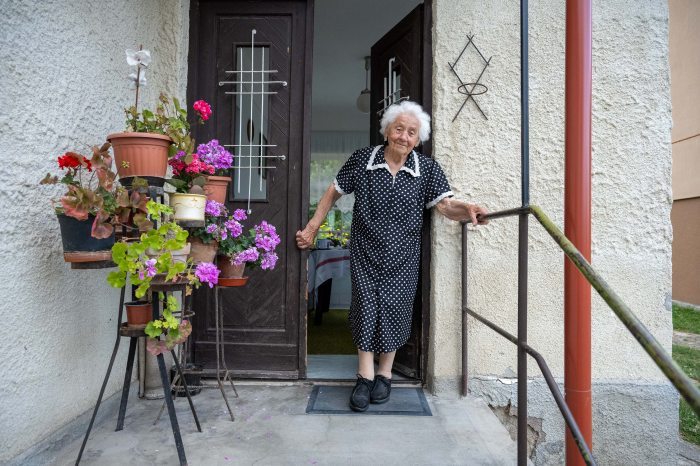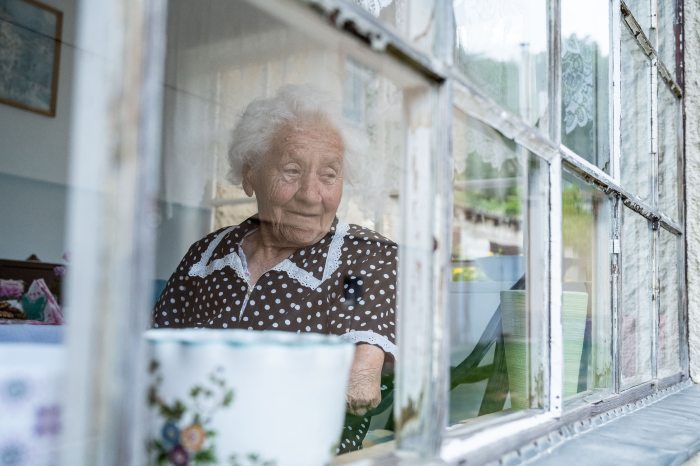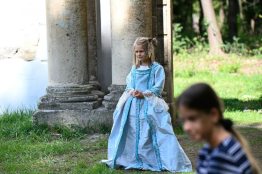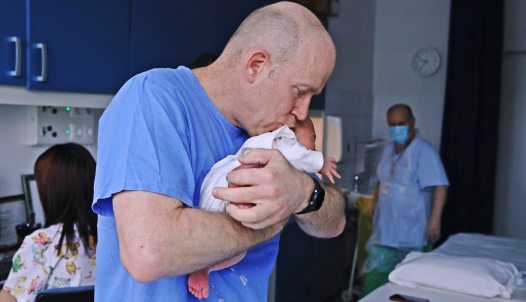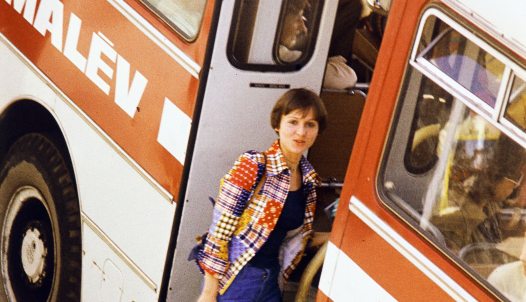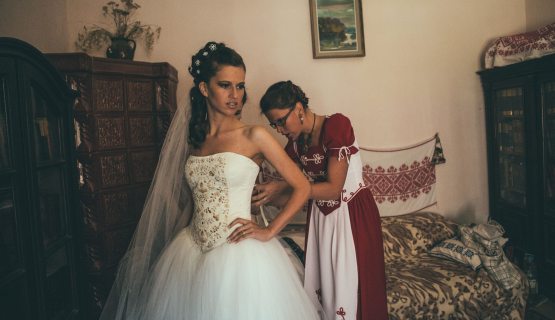“As a maid, I knew every nook and cranny of the Habsburg castle in Alcsút” – the story of 98-year-old Sári néni
Sára Komárominé Vojna, or Sári néni, was born on 1 November 1925 in Alcsút, where she grew up as the fourth child in a nine-child family. In her nearly 98 years, she never left her home village; when she got married, she moved only two houses away from her parents. When she was 13, she went to work at the castle in Alcsút as a maid. Her life was marred by several family tragedies, but her faith in God always gave her the strength to survive difficult times.
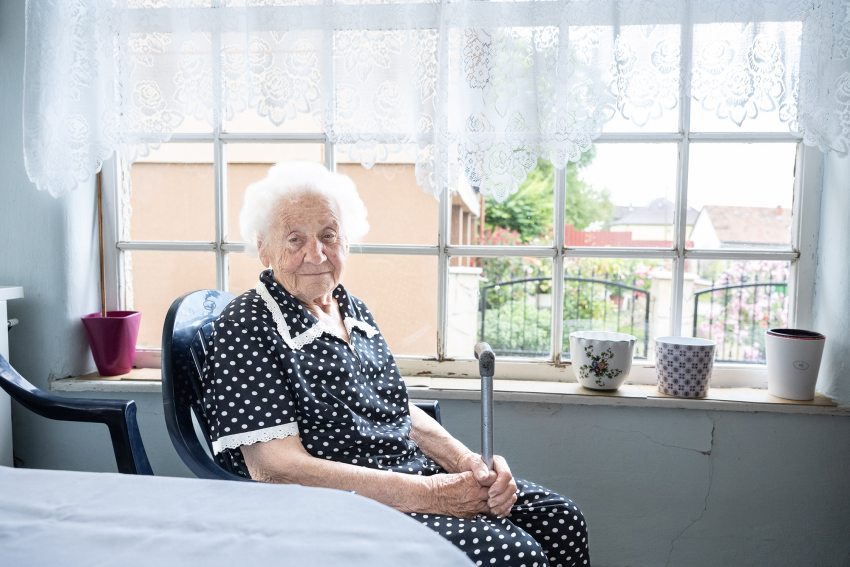
She lost one parent painfully early: she was just 11 when her 42-year-old father died of lung disease. Her brothers were drafted to fight during the war, and only two of the three returned home safely, as Sári néni's 17-year-old brother was shot dead by the Germans for not obeying an order.
He was given the order to blow up the bridge at Komárom, which leads from Slovakia to Hungary even today.
"He was a very handsome boy with curly blond hair and blue eyes. My mother found out about his death because my brother's landlord had witnessed the incident and buried my brother in his garden. When the soldiers who had been buried all over the place began to be collected, the authorities approached my mother saying that there would be an excavation and she could confirm her son's body. There were two large brown birthmarks on my brother's feet close to one another, and that's how my mother identified him."
Life and work in the Habsburg castle in Alcsút
Sári néni started working in 1938, before the Second World War broke out, at the Habsburg castle in Alcsút, where she served as a maid for six years. She was the youngest servant of all, having joined the family at the very young age of 13. She joined the Archduke's residence when her aunt, who was the maid to Archduchess Maria Augusta, wife of Archduke Joseph Augustus of Habsburg-Lotharingia, recommended her to the family.
"I knew every nook and cranny of the castle. The building had at least 200 rooms, but there were also many bathrooms and other rooms.
I had to tidy five rooms and two long corridors every day.
You didn't have to do a major clean-up, but you always had to do a decent job."
Sári néni, like the other maids, lived in the castle, giving her an even better insight into the everyday life of the Archduke's family. It was not difficult for her to see how strict the governesses were with the noble children. Archduke Joseph Augustus' son, Joseph Franz of Habsburg-Lotharingia, had eight children. Sári néni can still remember two of them very well: she can clearly recall what Archduchess Kinga and Archduke Mihály were like as children. He was known to everyone as Mitu.
"Poor little Archduke Mitu once cried so hard! I told the governess about it, and she said, "Sárika, that's what he's supposed to do!” I broke into tears hearing that sentence. In our house, no one ever said that a little child is supposed to cry, even though there were nine of us brothers and sisters. And the Archduchess Kinga was about five or six years old when her governess caught her primping in front of a mirror and as a punishment, she told her she couldn't leave the house that day."
"They didn't want her to brag about her beauty, even though she was a very beautiful little girl."
Fleeing from the Archduke's residence
The staff serving in the castle of Alcsút were treated in a privileged manner by the archducal family: they were rewarded with new clothes, shoes, or boots on holidays, and no one was singled out for special treatment. But they also helped the people of the village and those in need. They also supported several large families, where, when the girls got married, they were each given dowries. When they were forced to leave the family estate at the end of the war, they hoped to return within two weeks, but this was not to be. In Sári néni’s opinion, they did not deserve this cruel treatment.
Finally, in 1944, the castle was burnt down by the Russian army. Aunt Sári was still working there then, but fortunately, she managed to leave the building in time. Two officers accompanied her home - they on horseback, while Sári néni made the journey on foot. She took only what she could carry with her from the castle, the rest of her belongings were all consumed by the flames.
"As I was leaving with another maid, part of the castle was already so in flames that it was shocking to look at! The two officers told us not to stop and look around, otherwise, we would have burned inside.
Everything we had was left there. All our beautiful clothes, coats, shoes, tablecloths, how could I have carried them all out of the building in my hands?
We gave some of the worst of the Archduke's clothes to German soldiers, we made them change because we were so sorry to leave everything behind."
In search of a valuable gold bar
Shortly before the castle was burnt down, Sári néni underwent a severe ordeal, as she was imprisoned in Bicske and interrogated along with several other maids. A valuable gold bar had disappeared from the noble family's estate, and the police questioned the staff of the castle about it.
"When it was my turn, the police asked me how many gold bars I had taken from the castle. I was very surprised, I told them to stop joking about it. Then, in front of my eyes, the Russians started beating up an elderly maid who had committed the crime. They told me that I would get the same treatment if the soldiers found the gold in our house. I told them that then I would never be beaten! They asked me if I was sure, and I said I was absolutely sure."
Sári néni was not allowed to go home until the next morning. Then she was escorted home by police officers, which made her feel bad, as she was afraid of prejudice and knew that everyone in the village knew her. After that, there was another serious incident when Sári néni had to deal with the police. She was beaten up when she refused to go to forced labour because she was weakened by pneumonia, which had threatened her life before.
She was hit with a shotgun blast - she was lucky that she was well dressed, wearing several layers of clothing, so she was not seriously injured.
"When I got sick, I had a very high fever, I couldn't eat. One of the military officers, who was also a doctor, asked me to undress so he could examine me. I didn't want to, and I didn't want to let him give me the penicillin injection, which was then coming into fashion, but we didn't know it yet. The doctor knelt down by my bed and begged me, "Let him give it to you, little girl, otherwise you'll die." I finally let him. He gave me three more injections in addition to the first one. He would have given me more, but he had to go on to other places. Thank God, I was healed!"
Graduating from eighth grade as a mother of two
On 3 February 1951, at the age of 26, Sári néni married the neighbour's son, the same man she went to school with. They had two children, a son and a daughter. She had a good relationship with her husband, but unfortunately, he died of a stroke after 20 years of marriage.
Sári néni was always good at school: her report card, which she still keeps, was full of straight A's. She attended eight classes in all, although the last two she completed as an adult and a mother of two. She graduated from eighth grade the same year as her own son.
"There was a math problem my son had trouble solving. I told him I would go and help him in a minute.
Then he said:” But you haven’t even learnt it yet!”
Nevertheless, I started to look into that problem. It was one with exponentiation. I noticed that he had missed a step. I told him that he should always pay attention and that he should always do a cross-check of everything. He was very grateful for the help."
Her heart went out to those in need
Sári néni loved not only to learn but also to work. After her years at the castle, she worked in a sewing factory, then in the local mayor's office, but she also worked as a caregiver. She had to look after people in three villages, going around to see if the needy had medicine and food. Even though she wasn't allowed to - and it wasn't in her job description - she selflessly helped those who needed it.
"Sometimes I cooked them lunch. My folks at home hadn't even tasted my cooking and I was already taking it to the poor. And once an elderly lady hadn't had her wood chopped up because the lumberjack had fallen ill, so I sawed a day or two's worth for her."
Sári néni says that her life has flown by in a flash; she feels as if she had just been a kid. She never thought she would live to be so old. She says the secret of it all is that she is in God's grace.
She still reads the Bible regularly today, she says, because she believes it leads us straight.
She is happy that God has directed her life so that she could stay in her home village. All her memories are here, she could not go anywhere else, and she does not want to. Her family, grandchildren, and great-grandchildren are close by and she loves them very much. One of her great-grandchildren told her that she wished Sári néni would never leave her. Not even when she is grown up!

